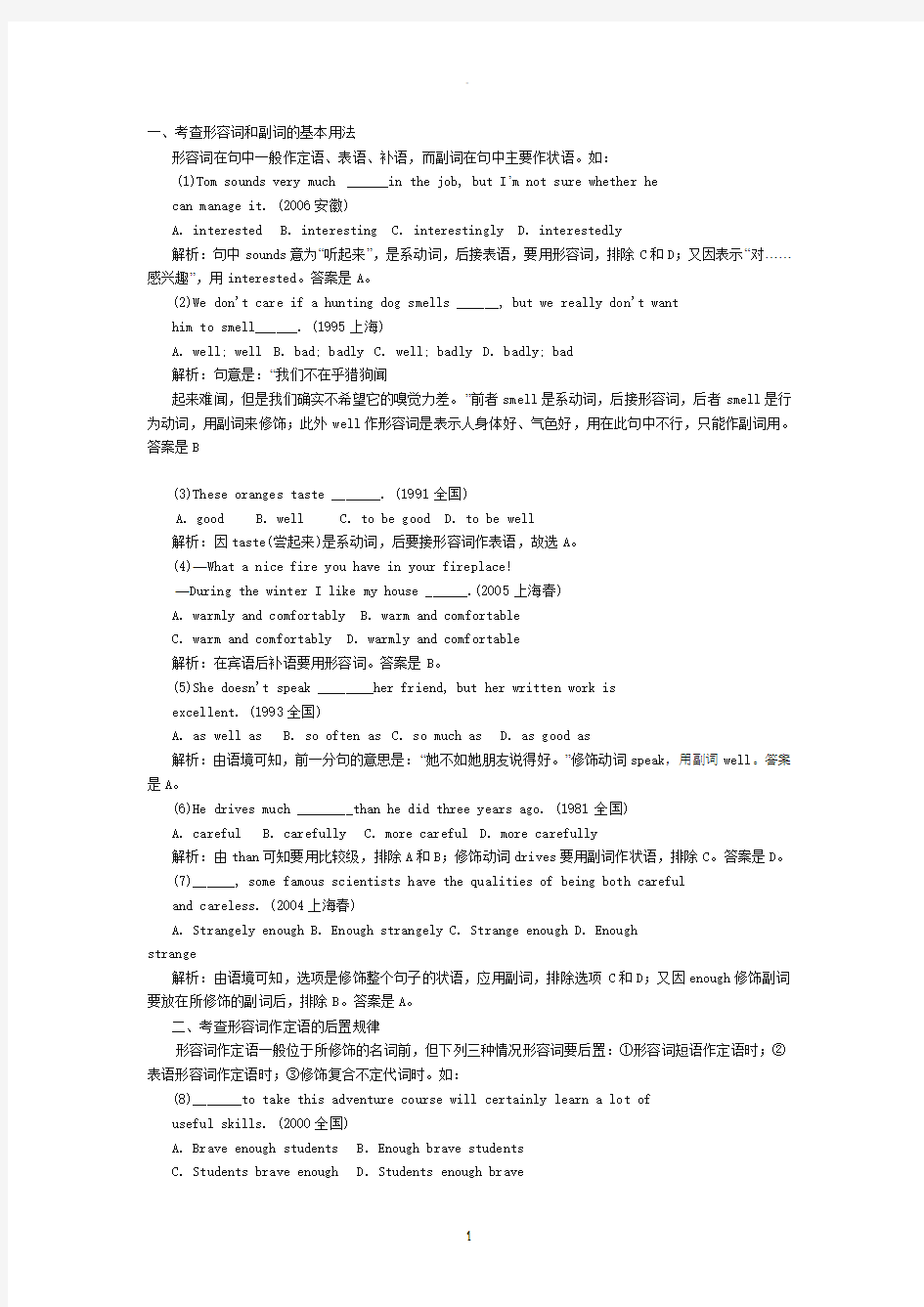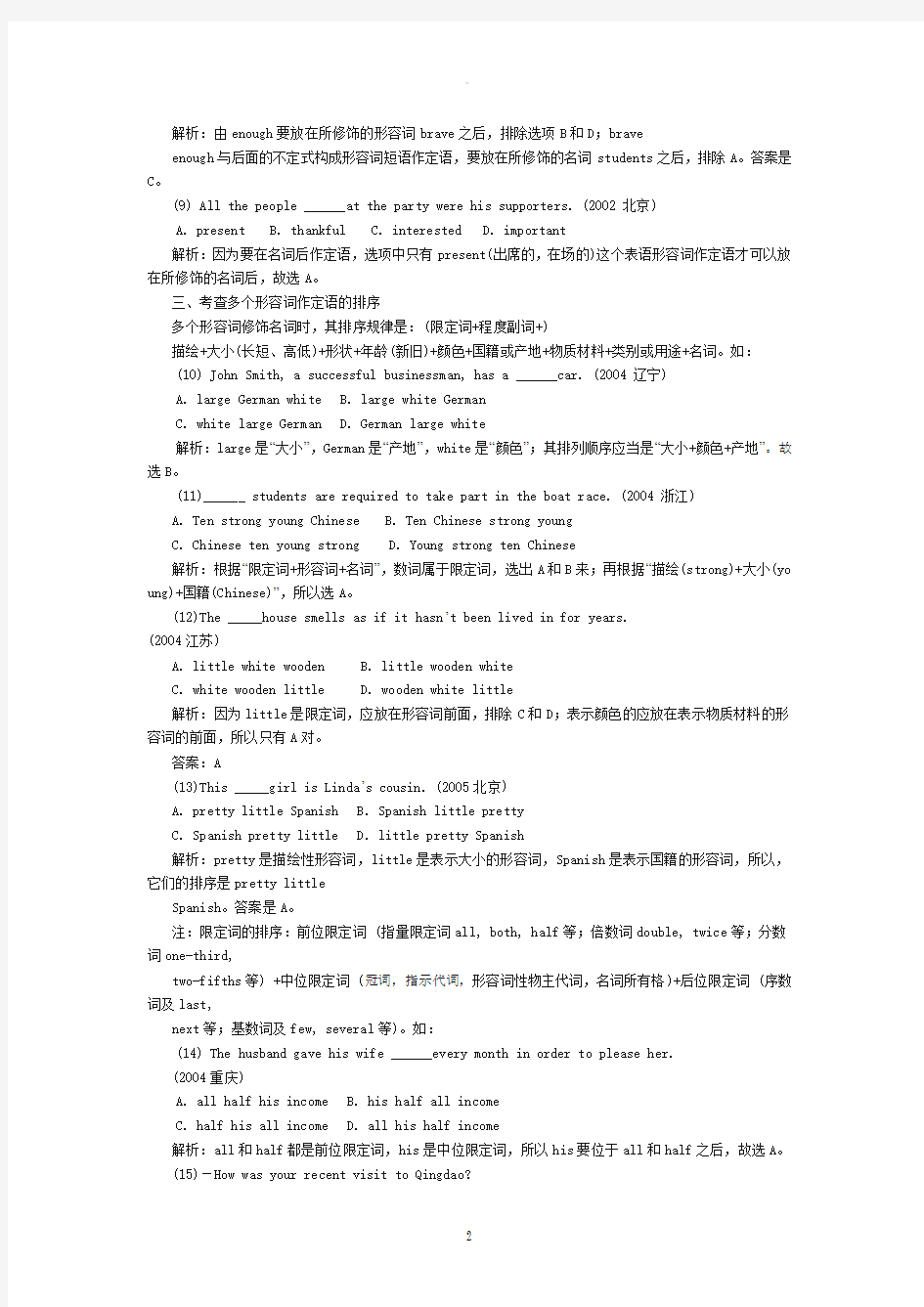

一、考查形容词和副词的基本用法
形容词在句中一般作定语、表语、补语,而副词在句中主要作状语。如:
(1)Tom sounds very much ______in the job, but I’m not sure whether he
can manage it. (2006安徽)
A. interested
B. interesting
C. interestingly
D. interestedly
解析:句中sounds意为“听起来”,是系动词,后接表语,要用形容词,排除C和D;又因表示“对……感兴趣”,用interested。答案是A。
(2)We don't care if a hunting dog smells ______, but we really don't want
him to smell______. (1995上海)
A. well; well
B. bad; badly
C. well; badly
D. badly; bad
解析:句意是:“我们不在乎猎狗闻
起来难闻,但是我们确实不希望它的嗅觉力差。”前者smell是系动词,后接形容词,后者smell是行为动词,用副词来修饰;此外well作形容词是表示人身体好、气色好,用在此句中不行,只能作副词用。答案是B
(3)These oranges taste _______. (1991全国)
A. good
B. well
C. to be good
D. to be well
解析:因taste(尝起来)是系动词,后要接形容词作表语,故选A。
(4)—What a nice fire you have in your fireplace!
—During the winter I like my house ______.(2005上海春)
A. warmly and comfortably
B. warm and comfortable
C. warm and comfortably
D. warmly and comfortable
解析:在宾语后补语要用形容词。答案是B。
(5)She doesn't speak ________her friend, but her written work is
excellent. (1993全国)
A. as well as
B. so often as
C. so much as
D. as good as
解析:由语境可知,前一分句的意思是:“她不如她朋友说得好。”修饰动词speak,用副词well。答案是A。
(6)He drives much ________than he did three years ago. (1981全国)
A. careful
B. carefully
C. more careful
D. more carefully
解析:由than可知要用比较级,排除A和B;修饰动词drives要用副词作状语,排除C。答案是D。
(7)______, some famous scientists have the qualities of being both careful
and careless. (2004上海春)
A. Strangely enough
B. Enough strangely
C. Strange enough
D. Enough
strange
解析:由语境可知,选项是修饰整个句子的状语,应用副词,排除选项C和D;又因enough修饰副词要放在所修饰的副词后,排除B。答案是A。
二、考查形容词作定语的后置规律
形容词作定语一般位于所修饰的名词前,但下列三种情况形容词要后置:①形容词短语作定语时;②表语形容词作定语时;③修饰复合不定代词时。如:
(8)_______to take this adventure course will certainly learn a lot of
useful skills. (2000全国)
A. Brave enough students
B. Enough brave students
C. Students brave enough
D. Students enough brave
解析:由enough要放在所修饰的形容词brave之后,排除选项B和D;brave
enough与后面的不定式构成形容词短语作定语,要放在所修饰的名词students之后,排除A。答案是C。
(9) All the people ______at the party were his supporters. (2002北京)
A. present
B. thankful
C. interested
D. important
解析:因为要在名词后作定语,选项中只有present(出席的,在场的)这个表语形容词作定语才可以放在所修饰的名词后,故选A。
三、考查多个形容词作定语的排序
多个形容词修饰名词时,其排序规律是:(限定词+程度副词+)
描绘+大小(长短、高低)+形状+年龄(新旧)+颜色+国籍或产地+物质材料+类别或用途+名词。如:
(10) John Smith, a successful businessman, has a ______car. (2004辽宁)
A. large German white
B. large white German
C. white large German
D. German large white
解析:large是“大小”,German是“产地”,white是“颜色”;其排列顺序应当是“大小+颜色+产地”。故选B。
(11)______ students are required to take part in the boat race. (2004浙江)
A. Ten strong young Chinese
B. Ten Chinese strong young
C. Chinese ten young strong
D. Young strong ten Chinese
解析:根据“限定词+形容词+名词”,数词属于限定词,选出A和B来;再根据“描绘(strong)+大小(yo ung)+国籍(Chinese)”,所以选A。
(12)The _____house smells as if it hasn’t been lived in for years.
(2004江苏)
A. little white wooden
B. little wooden white
C. white wooden little
D. wooden white little
解析:因为little是限定词,应放在形容词前面,排除C和D;表示颜色的应放在表示物质材料的形容词的前面,所以只有A对。
答案:A
(13)This _____girl is Linda’s cousin. (2005北京)
A. pretty little Spanish
B. Spanish little pretty
C. Spanish pretty little
D. little pretty Spanish
解析:pretty是描绘性形容词,little是表示大小的形容词,Spanish是表示国籍的形容词,所以,它们的排序是pretty little
Spanish。答案是A。
注:限定词的排序:前位限定词 (指量限定词all, both, half等;倍数词double, twice等;分数词one-third,
two-fifths等) +中位限定词 (冠词,指示代词,形容词性物主代词,名词所有格)+后位限定词 (序数词及last,
next等;基数词及few, several等)。如:
(14) The husband gave his wife ______every month in order to please her.
(2004重庆)
A. all half his income
B. his half all income
C. half his all income
D. all his half income
解析:all和half都是前位限定词,his是中位限定词,所以his要位于all和half之后,故选A。
(15)-How was your recent visit to Qingdao?
-It was great. We visited some friends, and spent the ______days at the
seaside. (1995全国)
A. few last sunny
B. last few sunny
C. last sunny few
D. few sunny last
解析:sunny与day的关系最密切,要紧靠day,或者根据last和few是限定词,要放在描绘性形容词sunny的前面,排除选项C和D;凭语感或由学过的in
the last few years可知,last要放在few前,排除选项A。答案是B。
四、考查副词在句中的位置规律
副词修饰形容词或其它副词时,一般位于被修饰词的前面,但enough却要放在被修饰的形容词或副词的后面。如:
(16)Although she did not know Boston well, she made her way ______ to the
Home Cirele Building. (2006湖南)
A. easy enough
B. enough easy
C. easily enough
D. enough
easily
解析:因make one’s way
to是固定词组,意为“前往”,修饰动词made要用副词,排除选项A和B;副词enough修饰形容词或副词,要放在后面,排除D。答案是C。
(17) If I had ______, I'd visit Europe, stopping at the small interesting
places. (1998全国)
A. a long enough holiday
B. an enough long holiday
C. a holiday enough long
D. a long holiday enough
解析:形容词long要放所修饰的名词holiday前;副词enough要放在所修饰的long之后,故选A。
此外,①频度副词always, usually, often,
never等一般放在行为动词前,或者情态动词、助动词或be动词之后。②表示方式的副词通常放在“动词(+宾语)”之后;③同时有表示时间、地点和方式的副词时,其顺序一般为:方式+地点+时间。如:
(18) ______I went to the railway station to see my friend off. (1991全国)
A. After eating quickly my dinner
B. After my quickly eating dinner
C. After eating my dinner quickly
D. After eating my quickly dinner
解析:quickly是表方式的副词,通常位于“动词(+宾语)”之后,故选C。
(19)They’re not very good, but we like______. (2000上海)
A. anyway to play basketball
B. to play basketball with them any way
C. to play with them basketball anyway
D. with them to play basketball
解析:like后应直接接宾语to play basketball,状语放在宾语后。答案是B。
(20)-Will you give this message to Mr Baker, please?
-Sorry, I can't. He ________. (1992全国)
A. doesn't any more work here
B. doesn't any longer here work
C. doesn't work any more here
D. doesn't work here any longer
解析:doesn’t后应紧跟动词原形work,排除选项A和B;地点状语要放在时间状语前面,排除选项C。答案是D。
五、考查–ed形容词和-ing形容词的区别
-ed形容词,通常说明人,意为“(某人)感到……”;-ing形容词通常说明事物,意为“(某事物)令人……”或“令人……的(事物)”。如:
(21) Laws that punish parents for their little children’s actions against
the laws get parents _____. (2004重庆)
A. worried
B. to worried
C. worrying
D. worry
解析:表示人(parents)“感到忧虑的”用-ed形容词作宾补,故选A。
(22)It is believed that if a book is ______, it will surely ______ the
reader. (2003上海)
A. interested; interest
B. interesting; be interested
C. interested; be interesting
D. interesting; interest
解析:前者是作表语,表示“(令人)有趣的”,用interesting,后者是在will后作谓语,用动词原形,表示“使(人)有趣”是interest。答案是D。
(23)Mr. Smith, ______ of the ________ speech, started to read a novel.
(2003京春)
A. tired; boring
B. tiring; bored
C. tired; bored
D. tiring; boring
解析:前空是“感到累”用tired,后空是“令人厌倦的”用tiring。答案是A。
(24)— I'm very ______with my own cooking. It looks nice and smells
delicious.
—Mm, it does have a______ smell. (2002春)
A. pleasant; pleased
B. pleased; pleased
C. pleasant; pleasant
D.
pleased; pleasant
解析:表示“感到高兴”用pleased;表示“令人愉快的”用pleasant。答案是D。
六、考查两种不同形式的副词的用法差异
即考查与形容词同形的副词与形容词后加ly构成的副词的区别。如:
(25) It was raining heavily. Little Mary felt cold, so she stood ______to
her mother. (2002北京)
A. close
B. closely
C. closed
D. closing
解析:因紧靠母亲站着,是指实际距离近,用与形容词同形的副词close,故选A。选项C的closely 一般指抽象意义,如listen
closely(仔细听)。
七、考查形容词和副词的比较等级
1. as+形容词/副词原级+as
(26)A typhoon swept across tiffs area with heavy rains and winds _____
strong as 113 miles per hour. (2006上海)
A. too
B. very
C. so
D. as
解析:as…as固定搭配。答案是D。
(27)John is the tallest boy in the class, ________ according to himself.
(2005安徽)
A. five foot eight as tall as
B. as tall as five foot eight
C. as five foot eight tall as
D. as tall five foot eight as
解析:as tall as five foot eight = as tall as five feet eight
inches高达五英尺八英寸。答案是B。
(28)John plays football________, if not better than, David. (1994全国)
A. as well
B. as well as
C. so well
D. so well as
解析:句意是:“John踢足球不比David更好,也会和他一样好。”从结构上看,去掉插入语if not b etter than,就更清楚地知道用as
well as,肯定句中不用so…as。答案是B。
2. not as/so+原级+as
(29) He speaks English well indeed, but of course not ______a native
speaker. (2004上海)
A. as fluent as
B. more fluent than
C. so fluently as
D. much fluently
than
解析:修饰动词speaks要用副词,排除A和B;又因than前必须是比较级,排除D;只有选项C正确。
(30)—Do you have a big library?"
—No, we don't─at least, not ________yours. (1982全国)
A. bigger as
B. as big as
C. as big than
D. as bigger than
解析:由语境可知,是要表达“至少没有你们的图书馆那么大”,表示“不如”是“not as+原级+as”。答案是B。
3. as +形容词+(a/an+)名词+as
(31) Our neighbour has ______ ours. (2003北京)
A. as a big house as
B. as big a house as
C. the same big house as
D. a house the same big as
解析:由句式结构判断,选B。
(32)It is generally believed that teaching is ________it is a science.
(2001全国)
A. an art much as
B. much an art as
C. as an art much as
D. as much an
art as
解析:由固定搭配“as+形容词+[(a/an+)名词]+as”可排除选项A,B和C。答案是D。
4. 比较级,A or B?
(33)Which do you think tastes________, the chicken or the fish? (1986全国)
A. well
B. good
C. better
D. best
解析:两者之间比较,要用比较级。答案是C。
5. 比较级+than
(34)–Did you take enough money with you?
–No, I needed _______ I thought I would. (2006全国II)
A. not so much as
B. as much as
C. much more than
D. much less than
解析:由no可知,“我需要的比我原来想会花掉的多得多。”答案是C。
(35)Mr. Smith owns _____collection of coins than anyone else I have ever
met. (2005山东)
A. larger
B. a larger
C. the larger
D. a large
解析:由than可知要用比较级,排除选项D;又因collection(收藏品)是可数名词,此处为单数又不是特指,要用不定冠词a。答案是B。
(36)The number of people present at the concert was _____than expected.
There were many ticket left. (2004福建)
A. much smaller
B. much more
C. much larger
D. many more
解析:因为主语是“去参加音乐会的人的数量”,而数量是讲大小,而不是多少的,排除B和D;又由后文还“有很多票剩下,可见参加音乐会的人比原来预计的要少,所以选A。答案是A。
(37)I have worked with him for some time and have found that he is ______
than John. (2004上海春)
A. more efficiently a worker
B. a more efficient worker
C. more an efficient worker
D. a worker more efficient
解析:形容词(efficient)作定语应当是在名词(work)前冠词(a)后,efficient的比较级当然是在其前面加more。答案是B。
(38)Although Linda tried hard in the exam, she did ______ than her
brother. (2000上海春)
A. more badly
B. much better
C. much badly
D. much worse
解析:由than可知用比较级,排除选项C;badly的比较级是worse,而不是在前面加more,排除选项A;由although(虽然……但是……)可知,她比她兄弟考得差,排除选项B。答案是D。
(39)This year they have produced ________grain ________they did last year.
(1989全国)
A. as less; as
B. as few; as
C. less; than
D. fewer; than
解析:因as…as之间要用原级,排除A;又因grain是不可数名词,而few是要放在复数可数名词前的,排除B和D。答案是C。
6. 隐含式比较级
有时省略或不点明被比较的对象,而是通过语境来暗示被比较的对象。
(40)I wish you'd do ______ talking and some more work. Thus things will
become better. (2006江苏)
A. a bit less
B. any less
C. much more
D. a
little more
解析:由more work和后面一句可知前面是less talking,排除C和D;这是肯定句,修饰比较级不用any,用a
bit与some相对应。答案是A。
(41)I don’t think this film is by far the most boring. I have seen______ .
(2006江西)
A. better
B. worse
C. the best
D. the worst
解析:由前文“我认为这部电影不是最没趣的”可知,“我看过(比这部)更差的电影”,省略了than this one。答案是B。
(42)That doesn’t sound very frightening. Paul, I’ve seen _____. What did
you like most about the film? (2004湖南)
A. better
B. worse
C. best
D. worst
解析:由前句“这听起来并不十分令人恐惧”可知,说话人曾见过比这个更令人恐惧的事,所以用比较级worse。答案是B。
(43)John did badly in the sports meet. I did even______. (1983全国)
A. worst
B. more bad
C. also badly
D. worse
解析:后面省略了than he did,意为“我比他更差”。答案是D。
(44)―Is your headache getting _____?
―No, it’s worse. (2005全国卷III)
A. better
B. bad
C. less
D. well
解析:由答语No, it’s worse.可知问句中用better,省略了than before。答案是A。
(45)It takes a long time to go there by train; it's ________by road.
(1993全国)
A. quick
B. the quickest
C. much quick
D. quicker
解析:由语境可知,句末省略了than by train,用比较级。答案是D。
(46)The pianos in the other shop will be ________, but________ (1990全国)
A. cheaper; not as better
B. more cheap; not as better
C. cheaper; not as good
D. more cheap; not as good
解析:单音节词cheap的比较级不是在前面加more而是在后面加er,排除选项B和D;又因as…as
之间要用原级,排除A。注意前空后省略了than
those in this shop,后空后省略了as those in this shop。答案是C。
欢迎您的下载,
资料仅供参考!
致力为企业和个人提供合同协议,策划案计划书,学习资料等等
打造全网一站式需求